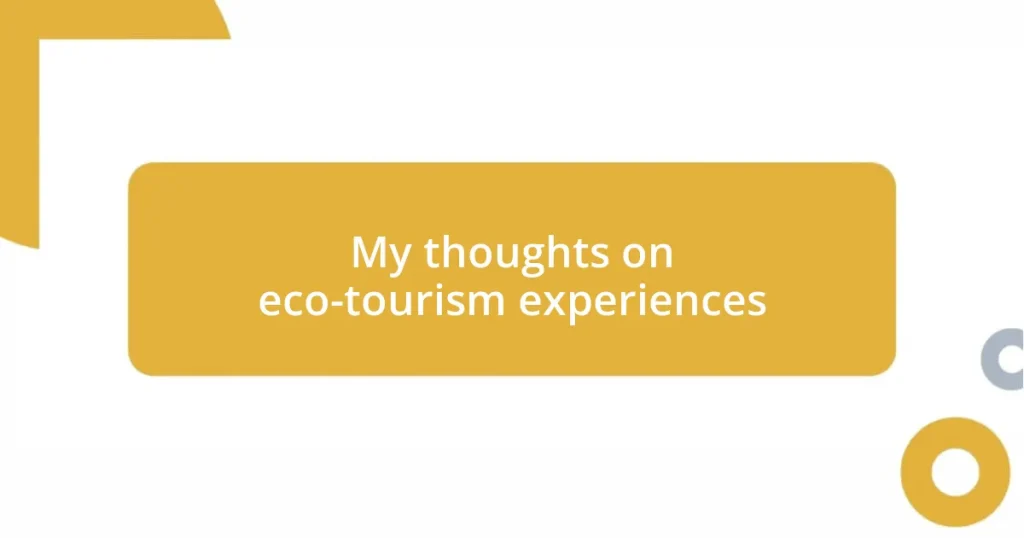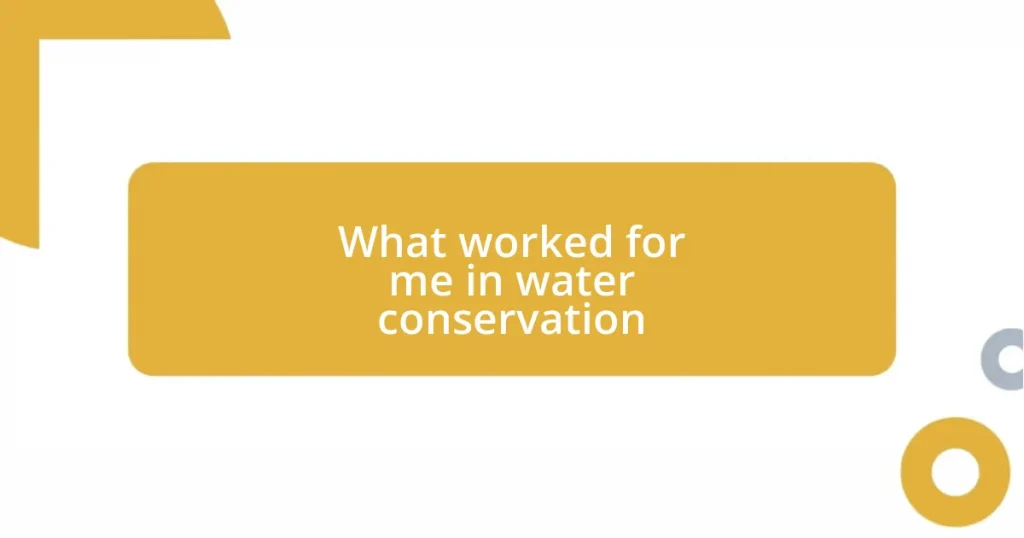Key takeaways:
- Eco-tourism emphasizes sustainability, minimizing impact, and fostering connections with local cultures and environments.
- Experiences like guided tours and community involvement enhance understanding of nature and promote a sense of responsibility among travelers.
- Choosing eco-friendly destinations and accommodations contributes directly to local economies and conservation efforts, making travels purposeful.
- Active participation in conservation activities, like beach clean-ups or volunteer projects, creates lasting memories and reinforces the importance of mindful travel.
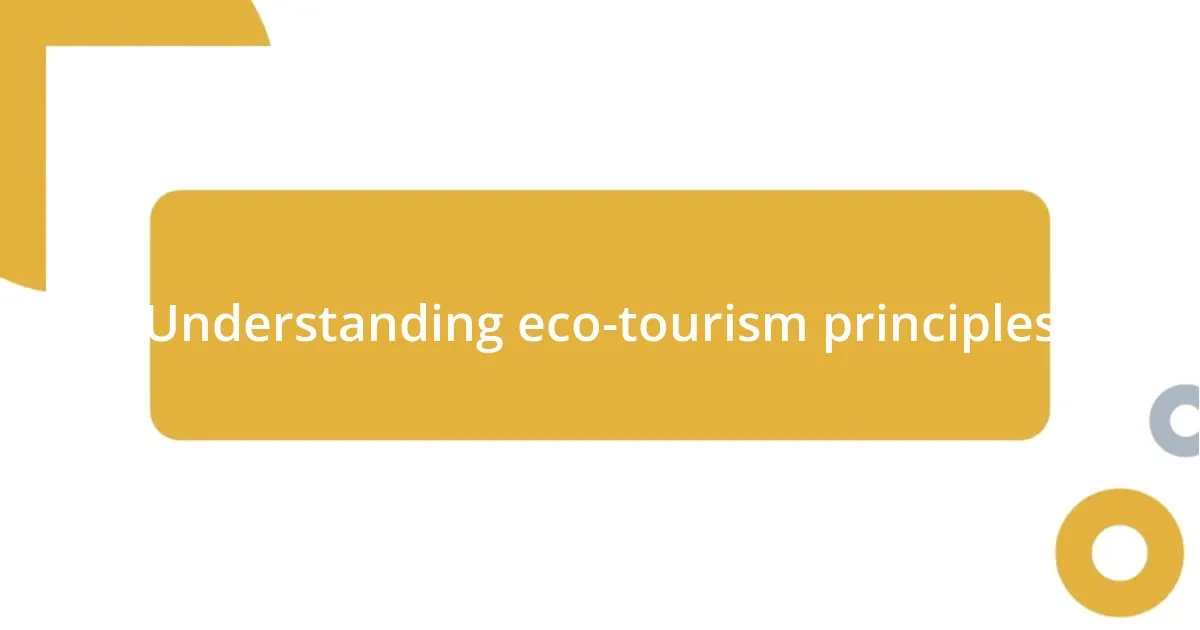
Understanding eco-tourism principles
Eco-tourism is built on a foundation of sustainability, emphasizing the importance of preserving natural environments while fostering a respectful relationship with local cultures. When I think about my travels, I remember a small village in Costa Rica where the community actively involved travelers in their conservation efforts. It struck me how much richer my experience was knowing that my visit helped sustain both the breathtaking rainforest and the lives of the locals who called it home.
One of the key principles of eco-tourism is minimizing impact. I’ve often wondered: how can we truly enjoy nature without leaving a mark? During a hiking trip in the Andes, I observed how my fellow travelers made a conscious effort to stick to marked trails. This simple action not only protected the delicate flora but also made me reflect on my responsibility as a visitor. The gratification from witnessing undisturbed nature was a poignant reminder that our choices matter.
Education is also a vital aspect of eco-tourism. I once participated in a guided tour where the guide shared stories about the ecosystem and its inhabitants. I was fascinated by the layers of knowledge that went beyond just seeing animals in their habitats. Isn’t it amazing how much more deeply we can connect with nature when we understand its complexities? This experience reinforced my belief that eco-tourism isn’t just about travel; it’s about transformation—shifting our perspectives to see not just the beauty, but also the fragility of our planet.
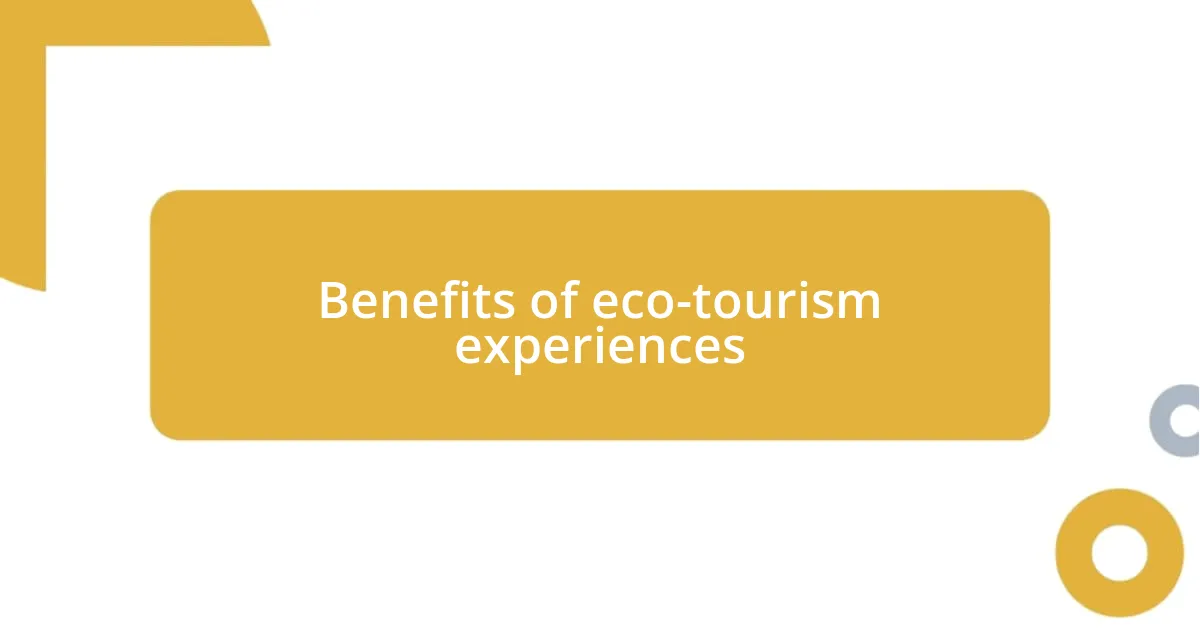
Benefits of eco-tourism experiences
When I reflect on the benefits of eco-tourism experiences, the first thing that comes to mind is the authentic connection it fosters with nature. I remember trekking through the lush rainforests of Borneo, where the vibrant sounds of wildlife surrounded me. It was a surreal experience that deepened my appreciation for biodiversity. I felt more than just a tourist; I was part of the ecosystem, contributing to its preservation during my stay.
Moreover, eco-tourism directly supports local economies. During my visit to a sustainable lodge in the Amazon, I learned how the proceeds helped fund education for children in the nearby village. This realization struck me hard. It was heartwarming to know that my vacation dollars were making a difference—investing in the community while protecting its resources. It’s a win-win situation that made my travels feel purposeful.
Perhaps one of the most profound benefits I’ve experienced is the sense of responsibility that comes with eco-tourism. I recall participating in a beach cleanup in Madagascar and how empowering it felt to collaborate with local residents. We shared laughs and stories as we worked side by side, all while knowing we were preserving this beautiful landscape for future visitors. That day left me with a lasting commitment to being a more mindful traveler, reflecting on the impact I can have even in small, everyday choices.
| Benefit | Impact |
|---|---|
| Connection with Nature | Deepens appreciation for environmental diversity |
| Support for Local Economies | Helps fund community initiatives and education |
| Sense of Responsibility | Encourages mindful travel practices |
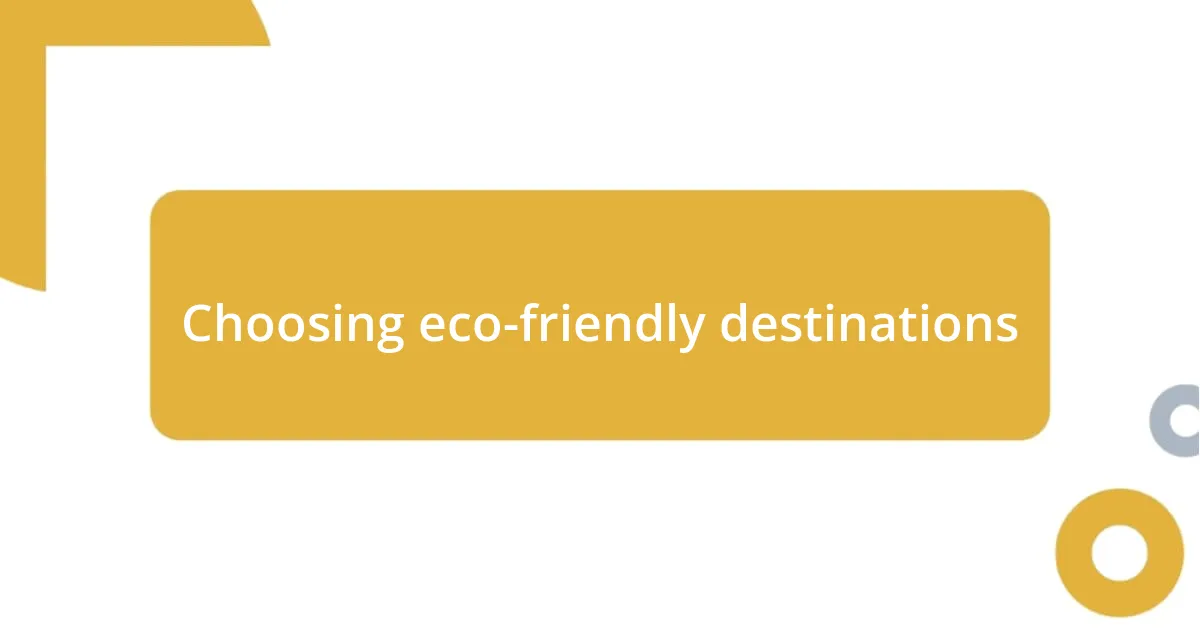
Choosing eco-friendly destinations
Choosing eco-friendly destinations can be a transformative and enriching experience. I remember planning a trip to Costa Rica with a focus on sustainability. It was exciting to research not just the beauty of the rainforests, but also how various lodges prioritized environmental stewardship. Staying at an eco-lodge that sourced all its energy from solar power made me realize that my choices as a traveler could align with my values. Knowing that my stay not only provided comfort but also supported local conservation efforts felt immensely rewarding.
Here are some key factors to consider when selecting eco-friendly destinations:
- Local Commitment: Look for places where the community actively participates in conservation and tourism, ensuring that your visit benefits both the environment and local culture.
- Sustainable Practices: Check if accommodations implement green practices, such as waste reduction, water conservation, and the use of renewable resources like solar energy.
- Wildlife Protection: Choose destinations that emphasize ethical wildlife viewing and support initiatives aimed at protecting endangered species.
- Cultural Preservation: Travel to areas that celebrate and protect local traditions, giving you a deeper connection to the cultures you’re visiting.
- Active Participation: Seek out eco-tourism experiences that encourage you to engage with nature, whether through guided hikes or beach clean-ups, allowing you to contribute while you explore.
There’s something genuinely fulfilling about making eco-conscious choices during my travels. It creates a sense of connection not just to the places I visit, but also to the broader mission of preserving our planet for generations to come.
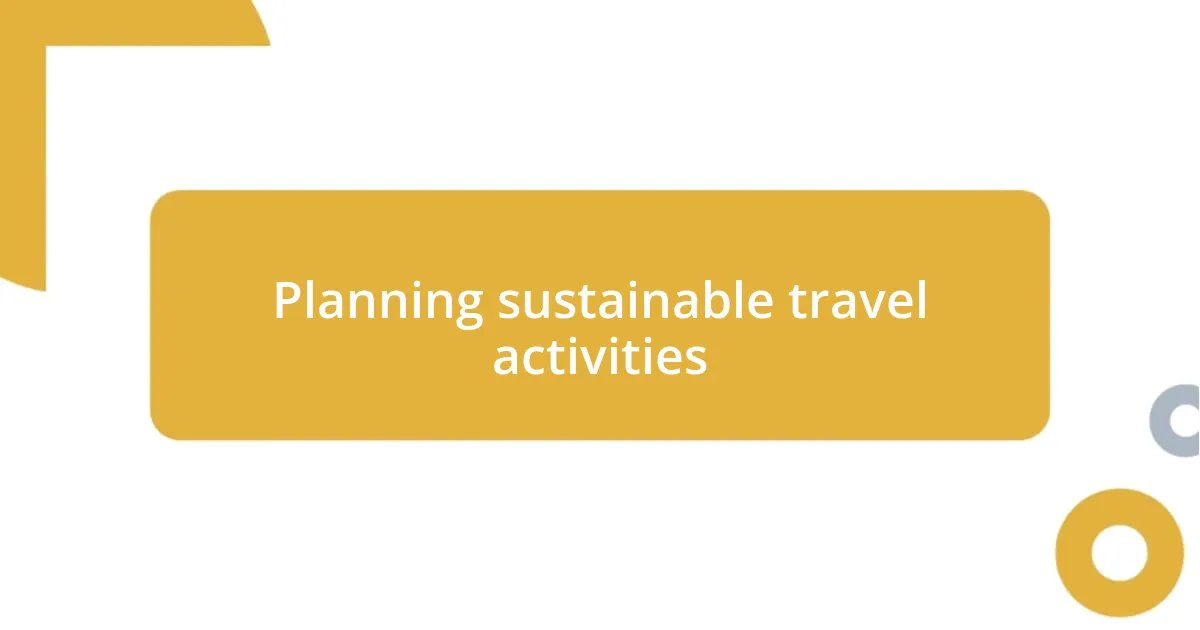
Planning sustainable travel activities
Planning sustainable travel activities is all about being intentional with how you engage with the environment and local communities. I distinctly recall my first experience planning such an adventure, where I chose to partake in a volunteer project for coral reef restoration in Belize. Not only did this hands-on activity enrich my understanding of marine ecosystems, but it also created lasting memories with fellow travelers who shared the same passion for sustainability. Have you ever found a deeper connection through shared purpose?
Another important aspect of planning is to prioritize experiences that genuinely benefit local ecosystems. For instance, during a trip to a national park, I decided to take a guided tour led by local indigenous people. Their insights about traditional land management and biodiversity were not only fascinating but highlighted the value of their deep-rooted knowledge. This experience underscored for me how local expertise can enhance our appreciation of nature while ensuring that our activities do not strain the environment.
When mapping out your sustainable travel activities, it’s equally crucial to assess the environmental impact of your choices. I’ve learned to ask questions like, “How will this activity impact the local wildlife?” or “What measures are in place to minimize waste during this tour?” Once, while kayaking in a marine protected area, I was amazed to see the care taken to educate tourists about maintaining a respectful distance from wildlife. That experience illustrated just how thoughtful planning can transform our travel into a vehicle for conservation, making the world a little brighter with each trip we take.
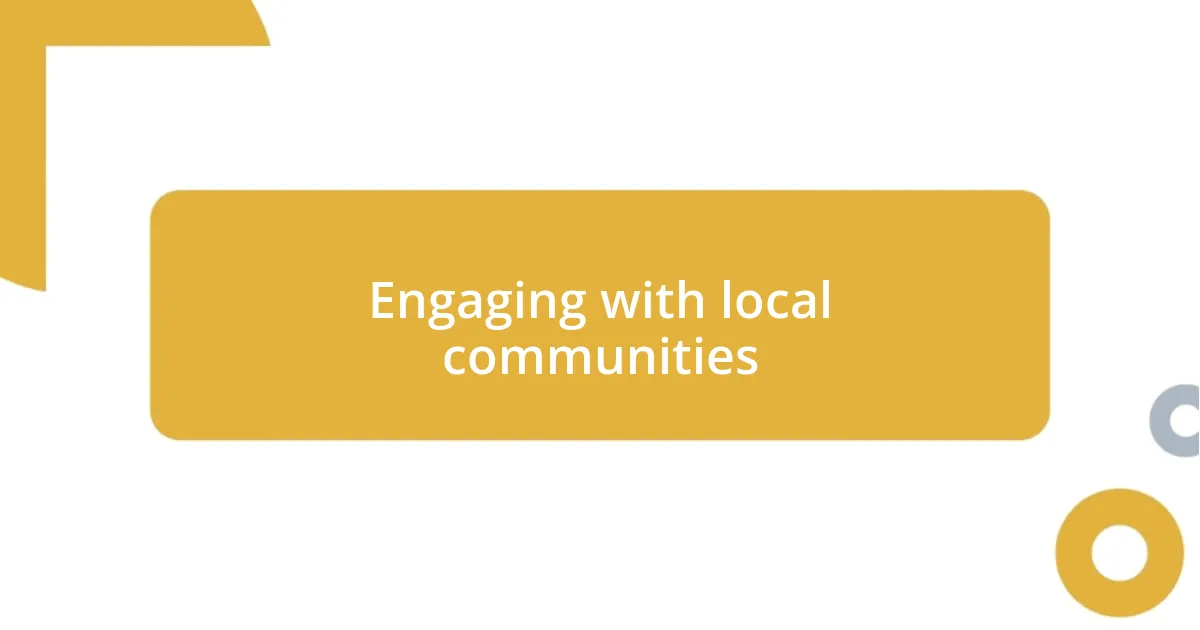
Engaging with local communities
Engaging with local communities is one of the most rewarding aspects of eco-tourism. I recall a trip to a small village in Thailand where I participated in a traditional cooking class. It was more than just learning to make curry; it was an opportunity to hear stories from local chefs about their culture and the significance of each ingredient. There’s something profound about connecting through food—it made me feel grounded in their world, even if just for a few hours.
I also found joy in supporting local artisans by purchasing handmade crafts. On a visit to a market in Peru, I struck up a conversation with a woman selling vibrant textiles. She shared how her craftsmanship was not only a means of livelihood but also a way to keep her traditions alive. Buying directly from her felt personal and impactful, as if I was weaving together the threads of her heritage into my own travel memories. This makes me wonder: how many stories do we miss when we choose convenience over connection?
Involving oneself in community activities can foster a deeper understanding of environmental issues. During one eco-tourism trip, I volunteered in a reforestation project alongside locals. The collective effort of planting trees was inspiring, but hearing the community’s stories about the changing climate brought the issue to life in a way statistics never could. It’s opportunities like these that prompt me to reflect: When we engage with local communities, aren’t we also sharing in their hope for a sustainable future?

Minimizing your ecological footprint
Minimizing your ecological footprint starts with making conscious travel choices that reflect your values. I once traveled to a beautiful coastal town where I made it a point to use public transportation instead of renting a car. Not only did I get to interact with locals, but I also felt a deep sense of connection to the environment around me. Have you ever noticed how walking through a town can unveil hidden gems that you’d miss when zooming by in a vehicle?
Another effective way to reduce your impact is by choosing accommodations that prioritize sustainability. During a visit to a remote lodge in Costa Rica, I was amazed to learn that they operated entirely on solar power and sourced their food from local organic farms. It struck me just how much joy I felt knowing my stay supported ecological efforts. Have you experienced the joy that comes from directly supporting sustainable practices?
I firmly believe in the power of leaving no trace while exploring natural spaces. I vividly remember hiking in a protected area and seeing signs that encouraged taking only pictures and leaving only footprints. This sentiment genuinely resonated with me as I carefully placed my steps to avoid damaging delicate plants. It’s a simple philosophy that can profoundly shape how we enjoy nature. Have you stopped to think about the little actions that can make a big difference during your adventures?
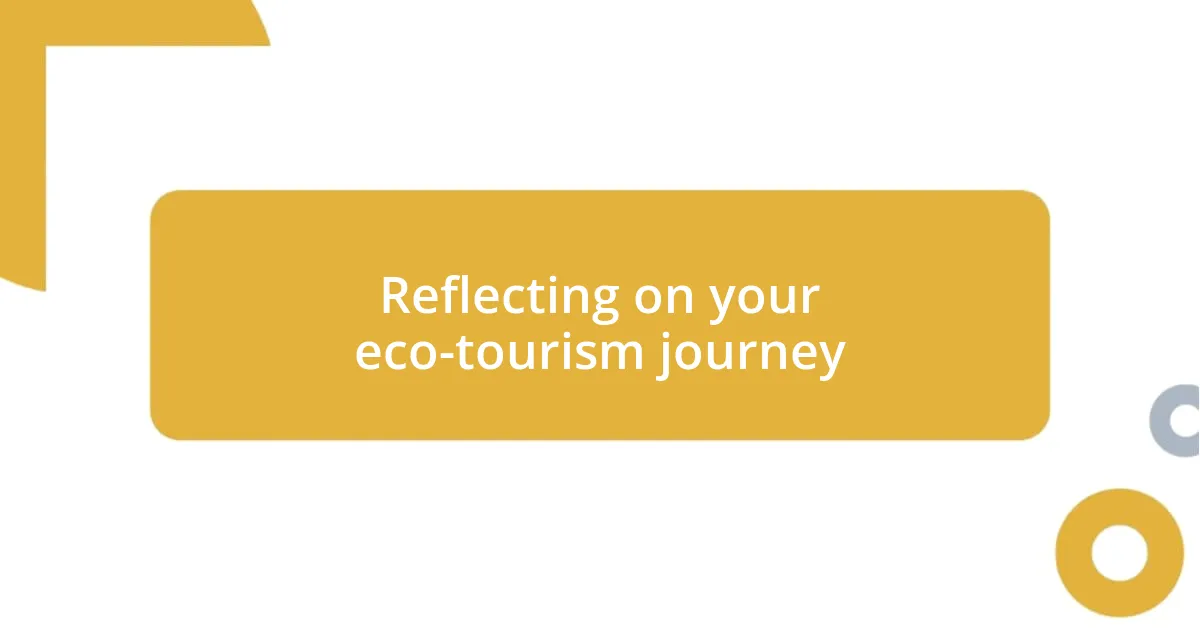
Reflecting on your eco-tourism journey
Reflecting on my eco-tourism journey often brings to the forefront the beautiful connections I formed with nature. One memorable moment was during a quiet morning paddle in a serene lake in Canada. As I glided through the water, I was struck by the stillness around me—just the sound of splashing paddles and birds calling in the distance. It made me realize how much peace nature can provide and how crucial it is to protect these spaces. Have you ever been in a moment of such tranquility that it changed your perspective on conservation?
Sometimes, I find myself thinking about how my travel choices contribute to a larger narrative of sustainability. For instance, on a hiking expedition in the mountains of Patagonia, I made a conscious effort to carry reusable containers for my snacks instead of relying on single-use packaging. Sharing snacks with fellow hikers, we exchanged stories about our travels and our commitments to the environment. This experience reinforced the idea that when we prioritize sustainability, we create a ripple effect that can encourage others to do the same. Have you considered how your small actions can inspire those around you?
Looking back at my experiences in eco-tourism, I realize they leave a lasting imprint on my values and lifestyle. During an incredible trip to a wildlife sanctuary in Africa, I witnessed firsthand the impact of conservation efforts on endangered species. It was heart-wrenching yet inspiring to learn how every small effort contributed to a greater cause. This trip reignited my passion for activism, pushing me to advocate for wildlife protection. What moments in your own journey have inspired you to take action toward safeguarding our planet?










